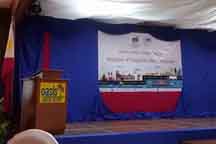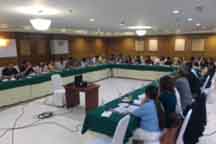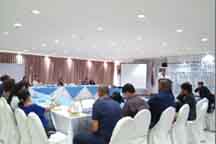The Senate passed on third reading the Senate Bill 1311 or the Ease of Doing Business (EODB) Act of 2017 which seeks to establish a national policy of ease of doing business, creating for the purpose the Ease of Doing Business Commission. The bill was sponsored by Senator Juan Miguel Zubiri, chair of the Senate Committee on Trade, Commerce and Entrepreneurship.
The bill sets a new prescribed processing period under which both national and local government offices will have to process the application and communicate the decision regarding the status of the application. This period will not be longer than three (3) working days for simple transactions and seven (7) working days for complex transactions from the time the application was received. For highly technical applications, the bill prescribes a maximum processing time of thirty (30) working days.
To ensure the attainment of the objective of this Act, an Ease of Doing Business Commission will be created. The Commission shall be the policy-making body on business registration and regulatory management and shall set the overall direction for the implementation of the National Policy on Ease of Doing Business.
Likewise, the House Committee on Trade and Industry recently approved the same version of the aforesaid bill. The House of Representatives is targeting to pass the measure before its Session break on 14 October 2017. The EODB Act is certified as urgent by President Rodrigo Duterte. –Ma. Divine Grace T. Derez

 Logistics Efficiency Indicators (LEI) Assessment Project was launched by The Department of Trade and Industry’s Competitiveness Bureau, in partnership with the World Bank-International Finance Corporation (WB-IFC), the Board of Investments (BOI) and the Export Development Council (EDC).
Logistics Efficiency Indicators (LEI) Assessment Project was launched by The Department of Trade and Industry’s Competitiveness Bureau, in partnership with the World Bank-International Finance Corporation (WB-IFC), the Board of Investments (BOI) and the Export Development Council (EDC). The exporters underscored the need to increase government budget to finance exporters’ participation in international trade fairs and have bigger and more presentable Philippine booths to be at par with exporters of other ASEAN countries.
The exporters underscored the need to increase government budget to finance exporters’ participation in international trade fairs and have bigger and more presentable Philippine booths to be at par with exporters of other ASEAN countries. These inputs were gathered during the recent Focus Group Discussions (FGD) for the PEDP 2018-2022 in Cebu and Davao attended by various sectors from handicraft, shell, agrimarine products, food, banana, cacao, furniture, lifestyle products and activated carbon. The next FGD will be conducted with the services sector specifically IT-BPM, audiovisual, animation, franchising and retailing and tourism and travel-related services. –
These inputs were gathered during the recent Focus Group Discussions (FGD) for the PEDP 2018-2022 in Cebu and Davao attended by various sectors from handicraft, shell, agrimarine products, food, banana, cacao, furniture, lifestyle products and activated carbon. The next FGD will be conducted with the services sector specifically IT-BPM, audiovisual, animation, franchising and retailing and tourism and travel-related services. –